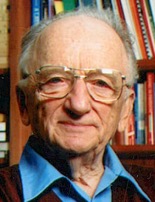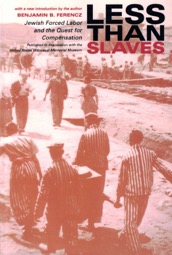
Ferencz was honorably discharged as a Sergeant but was soon recruited in General Telford Taylor’s legal team in the Subsequent Nuremberg Trials as a Colonel. With some 50 researchers, Ferencz scoured Nazi offices and archives in Berlin, collecting overwhelming evidence of Nazi genocide by German doctors, lawyers, judges, generals, industrialists and others who played leading roles in organizing or perpetrating Nazi brutalities. Taylor appointed Ferencz chief prosecutor in the Einsatzgruppen Case, Ferencz’s first case: all of the 22 accused were convicted; 13 received death sentences, of which 4 were eventually carried out.
Ferencz stayed in Germany until 1956, helping set up reparation programs for the victims of persecution by the Nazis, and negotiate the 1952 Reparations Agreement between Israel and West Germany and the first German Restitution Law in 1953. In 1956, Ferencz returned to the US and entered private law practice as a partner of Telford Taylor. In 1970, influenced by the Vietnam War, Ferencz left law practice and started working for the creation of an International Criminal Court that would be the world’s highest instance for crimes against humanity and war crimes. From 1985 until 1996, Ferencz was adjunct professor of international law at Pace University.
Ferencz received the Erasmus Prize in 2009, an honor recognizing contributions to European culture, society, or social science.
Click on the cover for details about the eBook:




